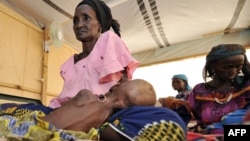GENEVA —
The United Nations has announced a new three-year action plan to tackle chronic hunger in Africa’s Sahel region. The U.N. is appealing for $2 billion to provide humanitarian assistance for 20 million people across the region in 2014.
More people than ever are at risk in the Sahel, according to the U.N. It says the number of people lacking access to food this year is almost twice as many as in 2013. And, of the 20 million people suffering food shortages, it says 2.5 million are in urgent need of life-saving assistance.
In the midst of this bleak assessment, the U.N. notes Mali and Burkina Faso have made dramatic progress in reducing the numbers of people dependent on aid. But, it says this good news is balanced by a big jump in insecurity in northern Nigeria, and the northern Sahelian parts of Cameroon and Senegal.
The U.N. regional humanitarian coordinator for the Sahel, Robert Piper, says the Sahel is a very fragile region, beset by poverty, limited basic services, risk of epidemics and erratic climate. He says it takes very little to push millions of vulnerable people over the edge.
“We need to approach this situation differently in a region with chronic problems," said Piper. "This is not a sudden cyclone in the Philippines, for example, but a region that is facing chronic challenges. We are working differently in the light of this. We are focusing on building resilience of families, intervening very early as the signals are seen in order to catch them before they lose too many of their assets."
Piper says the U.N. for the first time is embarking on a three-year plan so aid agencies can work systematically around these very complex issues. But, he says right now the Sahel is in the midst of an ongoing emergency and time is of the essence.
Director-General of the UN Food and Agriculture Organization Jose Graziano da Silva says his agency’s first priority is to make sure farmers in the Sahel have a successful planting season.
He says the best action is to prevent a bad harvest and food shortages from occurring. He says this kind of prevention makes great economic sense.
“Every dollar that we invested in early agriculture support we can save up to $20 in food assistance later," he said. "So, this number multiplied to 20 is very significant. And, we hope that we can…build resilience before the drought affects the region as we did early.”
But, he says the challenges ahead are daunting. He notes population growth in the region is outstripping a slight increase in food production in 2013. He adds the problem of food shortages is compounded by skyrocketing prices in most markets.
More people than ever are at risk in the Sahel, according to the U.N. It says the number of people lacking access to food this year is almost twice as many as in 2013. And, of the 20 million people suffering food shortages, it says 2.5 million are in urgent need of life-saving assistance.
In the midst of this bleak assessment, the U.N. notes Mali and Burkina Faso have made dramatic progress in reducing the numbers of people dependent on aid. But, it says this good news is balanced by a big jump in insecurity in northern Nigeria, and the northern Sahelian parts of Cameroon and Senegal.
The U.N. regional humanitarian coordinator for the Sahel, Robert Piper, says the Sahel is a very fragile region, beset by poverty, limited basic services, risk of epidemics and erratic climate. He says it takes very little to push millions of vulnerable people over the edge.
“We need to approach this situation differently in a region with chronic problems," said Piper. "This is not a sudden cyclone in the Philippines, for example, but a region that is facing chronic challenges. We are working differently in the light of this. We are focusing on building resilience of families, intervening very early as the signals are seen in order to catch them before they lose too many of their assets."
Piper says the U.N. for the first time is embarking on a three-year plan so aid agencies can work systematically around these very complex issues. But, he says right now the Sahel is in the midst of an ongoing emergency and time is of the essence.
Director-General of the UN Food and Agriculture Organization Jose Graziano da Silva says his agency’s first priority is to make sure farmers in the Sahel have a successful planting season.
He says the best action is to prevent a bad harvest and food shortages from occurring. He says this kind of prevention makes great economic sense.
“Every dollar that we invested in early agriculture support we can save up to $20 in food assistance later," he said. "So, this number multiplied to 20 is very significant. And, we hope that we can…build resilience before the drought affects the region as we did early.”
But, he says the challenges ahead are daunting. He notes population growth in the region is outstripping a slight increase in food production in 2013. He adds the problem of food shortages is compounded by skyrocketing prices in most markets.











